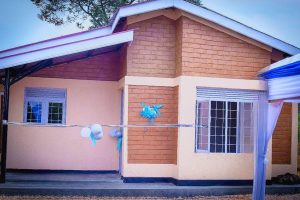Affordable Housing in Urban Informal Settlements: A Catalyst for Economic Growth in Uganda
By Robert Otim A good home is a base from which one can be economically productive. Good housing improves health and productivity of the occupants who in turn have the ability to contribute to the economic growth of a country. However, about 1.8 billion people globally within urban centers are struggling to find decent and affordable housing. The lack of affordable housing is a major driver of informal settlements. These are areas characterized by a high population, small and congested housing units with limited access to water and sanitation facilities and very prone to diseases and epidemics. The demand for affordable housing especially in urban centers is one of Uganda’s biggest challenges due to its fast growing population. This is coupled with increasing urban poverty resulting into the lack of access to credit and financing options hence the inability to take on opportunities such as rental housing or mortgage-financed homes which fuels the growth of informal settlements. Land tenure issues also contribute to the proliferation of informal settlements. Many residents in informal settlements do not have secure land tenure rights, making them vulnerable to eviction and displacement. This uncertainty discourages investment in better housing, leading to the growth of informal settlements as people settle on unoccupied or disputed land. Addressing the high prevalence of informal settlements in Uganda requires a multi-faceted approach that includes affordable housing initiatives, improved urban planning, secure land tenure, poverty reduction strategies, inclusive economic development, government policies, community participation, and the collaboration of various stakeholders to tackle this complex issue. In 2008, the government of Uganda approved the National Slum Upgrading Strategy and Action Plan in an effort to slow down the growth of slums and eventually stop the creation of new ones through legal and land market reforms, revamping planning and zoning regulations. The policy is also meant to provide security of land tenure as well as building codes to make housing more affordable to the citizens of Uganda. The policy further provides for inclusiveness by bringing all housing sector stakeholders on board to pull resources together to support government in providing affordable housing for Ugandans. Organizations such as Habitat for Humanity Uganda, a housing organization dedicated to eliminating poverty housing in Uganda has on a number of occasions yielded to government’s call through collaborating with government entities, private sector partners, and communities to seek out innovative ways of providing affordable and decent housing for Ugandans. Early this year, the organization together with the Ministry of Lands, Housing and Urban Development (MLHUD) launched the Home Equals campaign, a five year advocacy campaign dedicated to achieving policy change, at all levels, to ensure that people living in informal settlements have equitable access to adequate housing. The Home Equals campaign seeks to advocate for increased collaboration with settlers of informal settlements, accessible quality services and improved land governance and leadership by local government land committees. This campaign together with other initiatives are steps to addressing the affordability challenge in the housing sector through providing a platform and foundation to access wider development opportunities that contribute to the well-being of humanity and the country as a whole. Investing in affordable housing initiatives in urban informal settlements creates employment opportunities for workforce which not only alleviates poverty but also stimulates economic growth by generating income for individuals and local businesses. During the World Habitat Day in October this year, the MLHUD and Habitat for Humanity Uganda will hold the second annual Uganda Housing Symposium under the theme: Affordable Housing in Urban Informal Settlements as a Driver of Economic Growth at the Mestil Hotel in Kampala. The symposium will seek for solutions so that affordable housing projects serve as a catalyst for micro-enterprise development within urban informal settlements. As new housing units are built, the demand for local goods and services increases. This presents an opportunity for small businesses to flourish, providing goods and services such as building materials, plumbing, electrical work, and home furnishing. By supporting these micro-enterprises, the local economy is strengthened, creating a ripple effect of economic growth. Access to affordable housing in urban informal settlements directly impacts the health and education outcomes of residents. Adequate housing provides a safe and healthy living environment, reducing the prevalence of diseases and improving overall well-being. Moreover, children living in stable housing are more likely to attend school regularly, leading to better educational outcomes. Investing in affordable housing not only improves living conditions but also contributes to the development of a healthier and more educated workforce, which is essential for economic growth. Affordable housing initiatives can serve as a catalyst for the development of infrastructure in urban informal settlements. As housing projects are implemented, there is a need for improved road networks, water and sanitation facilities, and electricity supply. These infrastructure improvements not only enhance the quality of life for residents but also attract future investments and economic activities in the area. The writer is the National Director, Habitat for Humanity Uganda. noffice@hfhuganda.org

